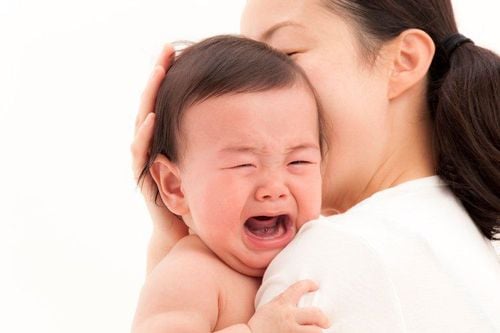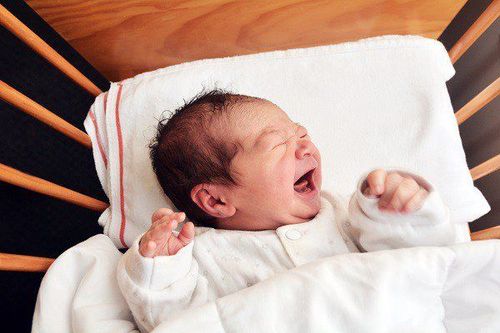This is an automatically translated article.
The article is professionally consulted by Master, Doctor Nguyen Thi An - Pediatrician - Neonatologist - Department of Pediatrics - Neonatology - Vinmec Ha Long International General Hospital. He was former Head of Pediatrics Department, Quang Ninh Provincial General Hospital. He has successfully treated many preterm infants with low birth weight and gestational age from 800 grams and 28 weeks or more, severe respiratory failure requiring invasive mechanical ventilation.Crying while sleeping is a stage, not a sign of a serious problem. The phenomenon of children crying at night is not uncommon, however, prolonged night crying will have a significant impact on the health and development of the baby.
1. Children cry at night because they have not formed a sleep cycle
Young children's bodies have yet to master the challenges of a regular sleep cycle. Most babies sleep about eight to nine hours during the day and another eight hours at night, although not all at once. Your baby probably won't sleep through the night (six to eight hours) until he's at least three months old. Some babies don't sleep through the night until six months of age or older. Crying is a baby's way of sending a message to its parents. Therefore, it is common for them to wake up frequently and cry at night in their sleep.
1.1. Babies cry at night because they are hungry Babies need to eat every few hours because their stomachs are very small. Therefore, most babies cry at night because they are hungry. From birth until 2 months of age, most babies wake up twice a night to feed. Between two and four months of age, most babies need a feed in the middle of the night. By the age of 4 months, babies sleep more than 7 hours and are bottle-fed without needing to breastfeed. Most breastfed babies as young as 5 months old can sleep for about 7 hours straight at night. Usually, at this age, babies don't need extra energy at night.
1.2. Digestion is not good When in the summer, because the baby eats foods that are easily allergic or difficult to digest, the baby will be uncomfortable and lead to night crying. It may be because the mother feeds the baby or sucks too much of the child, or the child is sick and has to take medicine to treat food, making the ability to digest food not good, causing bloating and gas. This causes the diaphragm to rise, making it even more difficult for the baby to breathe. At this time, the mother needs to pay attention to whether the baby's belly is enlarged, often farts but still can't defecate. If necessary, take the baby to see the doctor for instructions on giving the baby digestive aids.
The most important thing is to pay attention to the type of food for the baby to eat, which must be easily digestible. Give the baby food and drink when it's just finished processing, don't let the baby eat too full because the baby's stomach is still small, easily leading to bloating.

Em bé ăn những loại thức ăn dễ bị dị ứng hay khó tiêu sẽ khó chịu và dẫn tới trẻ hay khóc đêm
1.3. Crying due to bed-wetting Babies won't sleep well when their diapers are soaked with urine. At this time, the baby will roll back and forth, fuss, ... to "signal" to the mother. Therefore, it is necessary to change the baby's diaper in time to prevent the baby from crying at night. About 30 minutes before bedtime, the baby should not drink too much water. Otherwise, about half an hour to two hours after going to bed, your baby will urinate three to four times.
In addition, if the mother knows the "rules" of the child's nocturia, the mother can be proactive in changing the baby's diaper first. This will prevent the baby from being uncomfortable leading to crying at night, moreover, ensuring sleep for everyone around.
1.4. Allergy-related nighttime crying in children When children have persistent nighttime crying that is not related to hunger or other problems, the cause is most likely due to a cow's milk protein allergy. Colic caused by cow's milk protein allergy tends to be in 3 patterns: Crying for more than three hours a day (usually in the evening), for more than three days a week, and for more than three weeks. In this case, a pediatrician should be consulted to determine if the baby's crying is the result of a cow's milk protein allergy.
In addition, other allergens can irritate the baby's airways, leading to night crying. These irritants can come from cigarette smoke, baby powder, paint fumes, smoke scents, insect sprays, etc. So it's important to make sure your baby's bedroom is well-ventilated. , air circulates to the outside, minimizes irritants, keeps the bedroom clean and the air in the room needs to be fresh.
1.5. Babies often cry at night due to illness Babies who have just been born not long ago often have a stuffy nose when breastfed, or when babies have a cold, there are many nasal scabs in their nasal passages, blocking the airways, leading to babies. difficulty breathing through the nose. At that time, the baby has to use his mouth to breathe. The dry air from outside hits the throat, making the baby's throat dry, leading to a dry cough and causing a very uncomfortable feeling. At this time, the mother should use physiological nasal washes to clean the baby's nose, soften the nasal scales, clean and clear the sinuses, so that the baby can breathe easily, and continue to have a healthy life. good sleep.
In addition, a baby with a cold is easy to wake up at night and cry because the baby's respiratory tract is difficult. Mothers need to apply measures to reduce fever safely, as soon as possible by applying warm compresses to their children,... It is necessary to take the children to medical facilities to promptly shorten the duration of the illness and alleviate the symptoms. go to symptoms, ..., avoid the situation that the baby has too high a fever, causing dangerous convulsions for the child. Use decongestant nasal drops as prescribed by your doctor to help your baby sleep well.
1.6. Noise and temperature in the bedroom Children who cry at night can be caused by sudden noises or sounds when the baby is sleeping, which can wake the baby up causing the baby to startle and fuss. Therefore, parents should try to keep the baby's bedroom quiet, limiting noise or loud sounds. When choosing a bedroom for your baby, you need to choose a quiet location for the baby to have a deep sleep.
Room temperature that is too hot or too cold is also the cause of affecting the baby's sleep, causing the baby to cry at night. Adjust the temperature in your baby's room to suit the season. Use a room thermometer to monitor the temperature. Do not overdress the baby, or the baby may become too hot. As a general rule, babies need an extra layer of clothing to be comfortable. Using a portable blanket will be more convenient.

Trẻ em hay khóc đêm có thể là do tiếng ồn hay âm thanh bất ngờ
1.7. Excessive activity The child's nervous system is developing and not yet mature, the inhibitory ability is still poor, so if the baby has too much activity during the day, it will make the child's brain still in a very low state. euphoria causes a child to suddenly cry while sleeping. This even creates temporary dreams called nightmares, making the baby scared and startled. Therefore, during the day, the baby should not be allowed to play too much to make the child's brain reach an extreme level of excitement, to ensure that the baby has a peaceful sleep.
2. Other reasons why babies cry at night
The baby leaves the mother suddenly: Due to the sudden departure of the mother or the person holding the baby from home or the change of the nanny, the baby has a feeling of insecurity, anxiety also causes night crying. Relatives of the baby should gently comfort and comfort the baby to help the baby quickly adapt to the new situation. Changes in the mood of adults: If the closest and loved ones of the baby, especially the mother, have an unstable mood, for example, anger, anxiety, sadness, insomnia,. .. This is also very contagious to the baby, if the relationship in the family is disturbed, family conflict or moving to another place, ... also makes the child feel anxious, or fussy. At night. Therefore, adults should not because their unhappy mood adversely affects the baby's sleep. Even this also affects the psychological development of children later. Insect bites: Children who cry at night may be bitten by insects or get into their ears, making them itchy and uncomfortable. Especially pinworms often harass babies at night,... Our country is located in the tropics, so the number of insects is also quite rich and diverse. Especially in the summer, the hot weather with it is a condition for many insects to proliferate, causing children to have rashes and heat rash. Mothers should pay attention to the cleanliness of the baby, keeping the baby safe from arthropods such as mosquitoes, ants, blood-sucking bugs, etc. Teething can also make the baby feel difficult. more bearable than usual. When the baby is 5 months old, at this time the baby will start teething and by the time he is two years old, he will have all the teeth. Babies often cry at night, become irritable and restless in the week before a new tooth comes in. Mothers need to pay attention to the signs of teething such as cheeks, gums, chin if they feel red, swollen or have signs of mild fever to find the cause. According to experts, in this case, local cold compresses should be used to reduce discomfort in children. When the baby's teeth grow longer, sleep will return to its original state.

Trẻ mọc răng cũng có thể khiến cho em bé cảm thấy khó chịu hơn bình thường
Babies cry at night for no apparent reason Children often cry at night for no reason: Along with crying, the mother can see that the baby has other manifestations such as hiccups, sneezing,... Sometimes, babies Crying for no reason at all. If this happens, try to comfort the baby by patting her, singing a lullaby, talking to her gently, or swaddling the baby in a blanket... Before long, the mother will probably be Know what your baby needs by the way he cries. At the same time, take the baby to a medical facility for additional prescriptions because it is possible that the baby is lacking some micronutrients that make the baby cry at night, or startle, leading to confusion. sleep disturbance. Babies cry at night for many reasons. The exact cause of persistent crying is unclear. It is so common in infants, that many experts think it may simply be a period of normal development. To overcome this situation, parents can put the baby on their chest, gently pat the baby to calm down, or comfort the baby by breastfeeding or buttoning the bottle. Hold your baby in a standing position and bring your baby's body to your shoulders and chest. Gently put the baby down in the swinging cradle and can be combined with lullabies to coax the baby back to sleep. Infants aged 0-6 months are prone to respiratory diseases, respiratory infections and infections. gastrointestinal infections if the baby starts solids early or the storage and preparation of milk is not guaranteed. To protect children's health, parents should do well to exclusively breastfeed their babies for the first 6 months (if possible) and vaccinate on schedule.
As soon as the child shows symptoms such as anorexia, fatigue, crying, parents need the child to go to the hospital to be consulted by specialists for monitoring and treatment. The pediatric department at Vinmec International General Hospital is the address for receiving and examining diseases that infants and young children are susceptible to: viral fever, bacterial fever, otitis media, pneumonia in children. With a system of facilities, modern medical equipment, sterile space, minimizing the impact as well as the risk of disease spread, Vinmec will bring satisfaction to customers. and is highly appreciated by industry experts with:
Gathering a team of leading pediatricians: including leading experts with high professional qualifications (professors, associate professors, doctors, Master's degree), experienced, worked at major hospitals such as Bach Mai, 108.. The doctors are all well-trained, professional, conscientious, knowledgeable about young psychology. In addition to domestic pediatric specialists, the Department of Pediatrics also has the participation of foreign experts (Japan, Singapore, Australia, USA) who are always pioneers in applying the latest and most effective treatment regimens. . Comprehensive services: In the field of Pediatrics, Vinmec provides a series of continuous medical examination and treatment services from Newborn to Pediatric and Vaccine,... according to international standards to help parents take care of their baby's health from birth to childhood. Advanced techniques: Vinmec has successfully deployed many specialized techniques to make the treatment of difficult diseases in pediatrics more effective: neurosurgery - skull, stem cell transplant blood in cancer treatment. Professional care: In addition to understanding children's psychology, Vinmec also pays special attention to the children's play space, helping them to play comfortably and get used to the hospital's environment, cooperate in treatment, improve the efficiency of medical treatment.
Please dial HOTLINE for more information or register for an appointment HERE. Download MyVinmec app to make appointments faster and to manage your bookings easily.













